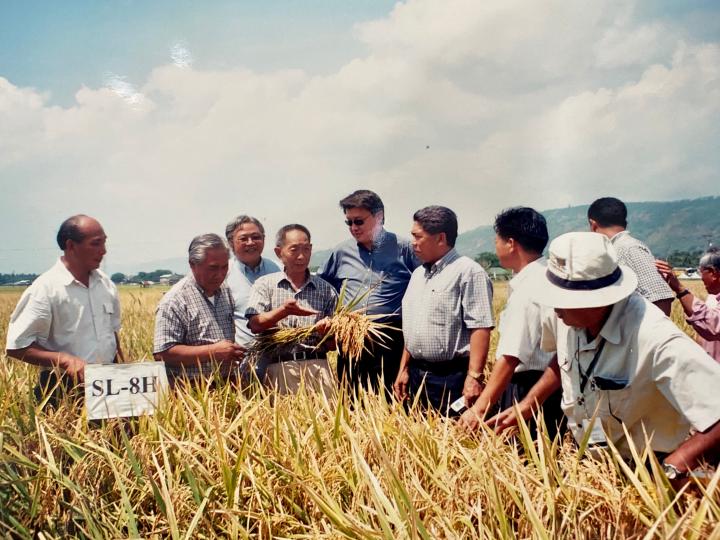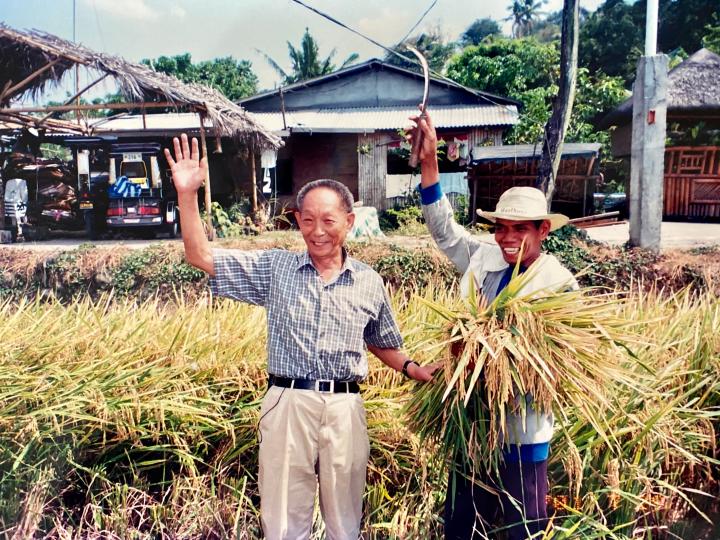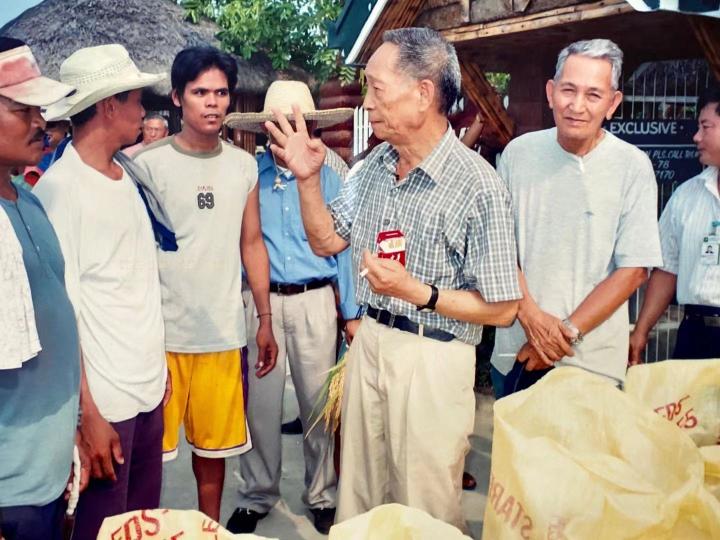
Chinese scientist Yuan Longping (L4) visits a rice farm in Laguna province, the Philippines, April 17, 2003. (Photo provided by Henry Lim Bon Liong/Xinhua)
Philippine businessman Henry Lim Bon Liong described his 24-year-old friendship with Yuan Longping, the "father of hybrid rice", as among the most precious memories in his life.
"Yuan is so fluent in English that he could not only discuss academic topics at ease with his international counterparts, but also teach the Philippine farmers the hybrid rice plantation method, which garnered him a high level of respect from the latter," said Lim.
by Xinhua writers Yan Jie, Liu Kai
MANILA, May 24 (Xinhua) -- "The Philippine farmers who plant hybrid rice all know the name of Chinese scientist Yuan Longping," Philippine businessman Henry Lim Bon Liong said.
Lim described his 24-year-old friendship with Yuan Longping, the "father of hybrid rice", as among the most precious memories in his life.
"It has been two or three years since I last met Yuan. He is pretty easy-going all his life, enjoys eating spicy dishes, such as Kung Pao Chicken and Mapo Tofu, swimming and playing Mahjong," Lim, dubbed as the "hybrid-rice king of the Philippines", told Xinhua in an interview.
Lim said it is Yuan who brings the hybrid rice to the Philippines, a Southeast Asian country which heavily relies on rice importation, to serve as a robust food source.
Yuan, a household name in China, renowned for developing the first hybrid rice strain that relieved countless people of hunger, died of organ failure at 91 on Saturday.

Chinese scientist Yuan Longping (L) visits a rice farm in Laguna province, the Philippines, April 17, 2003. (Photo provided by Henry Lim Bon Liong/Xinhua)
Yuan's pioneering research on hybrid rice began in 1964, and after nine years of painstaking research and intensive testing, his team successfully cultivated the world's first high-yield hybrid-rice strain in 1973.
For Yuan, the Philippines, where he traveled for more than 30 times throughout his life, is a country of special significance.
In 1979, he attended an international seminar in the Philippines, making the debut of his research on hybrid rice to the world. Three years later, when participating in another conference in the Philippines, Yuan was reputed as the "father of hybrid rice" by his peers around the world.
The cross-generation friendship between Lim, then in his 50s, and Yuan, then in his 70s, dated back to 1997. "We felt like old friends at the first meeting," Lim recalled. "Yuan said he had fulfilled his task in pulling Chinese people out of hunger, but many people in the Southeast Asian countries still got not enough to eat. He told me he wanted to make a change staring from the Philippines."
Bearing this aim, in cooperation with Lim, Yuan sent altogether 75 hybrid-rice strains to the Philippines for a trial plantation in a 5-hectare land.
Having spent years of laborious research and constant testing, Lim and Yuan successfully cultivated the pioneer hybrid rice for tropics, which possesses high yielding potential, good grain quality and multiple resistance to diseases and pests.
Hybrid rice for tropics was subsequently grown gradually in both northern and southern Philippines, and farmers reaped incredible output after switching to Yuan's hybrid varieties.
Now its accumulated planting area in the Philippines has exceeded one million hectares, of which the output covers 30 percent or higher of the total rice production in the Philippines.
"The hybrid rice developed by Yuan's team here now has achieved the highest yield of 15 tonnes per hectare, which is about three times higher than that of conventional rice strains in the Philippines," Lim said, adding that "Yuan, my teacher, should take all the credit."
A Chinese calligraphy of Yuan is hanging on the wall of Lim's office in Makati City of Metro Manila, with English translation "knowledge, perspiration, inspiration and chance" written by Yuan correspondingly beneath each Chinese characters.

Chinese scientist Yuan Longping (C) visits a rice farm in Laguna province, the Philippines, April 17, 2003. (Photo provided by Henry Lim Bon Liong/Xinhua)
"Yuan is so fluent in English that he could not only discuss academic topics at ease with his international counterparts, but also teach the Philippine farmers the hybrid rice plantation method, which garnered him a high level of respect from the latter," said Lim.
Thumbing through an album, Lim showed Xinhua the photos that he took with Yuan. "He is indifferent to fame and wealth, living quite a simple life. Whenever making a visit to the Philippines, he could only accept my dried mongo or T-shirts as gifts and refused the other valuable ones," Lim said.
The passing away of Yuan even set off mourning and remembrances among the Philippine farmers who plant hybrid rice.
"They kept sending me short messages to express their condolences," said Lim, "They thought he could have lived to be a hundred."
Regretting not being able to attend Yuan's memorial service in China due to the COVID-19 pandemic, Lim concluded that he cherished the trust Yuan cast on him during all these years.
"I hope to continue to pursue his lifelong dream, which is to constantly raise productivity and eradicate hunger globally," said Lim. ■




